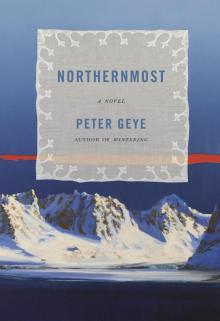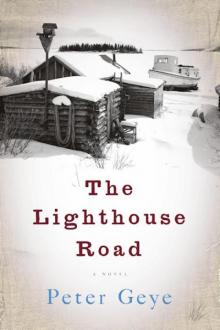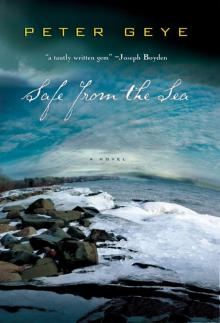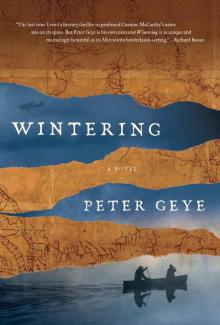- Home
- Peter Geye
Northernmost Page 2
Northernmost Read online
Page 2
“Odd Einar, stop at Bengt’s bakery before you head home. Buy a loaf and some butter. I’ve known you since we were runts. I don’t like the look of you now. A hungry man is a sad thing.”
He pushed the money into my hand and put his glove on again, slung the mail sacks over his shoulder, and this time walked off. He didn’t whistle, Old Magnus.
* * *
—
The Grønnevoldsgaden was swallowed by fog as I walked up it. The whole village was, as though it burned for the second time. On the corner of the Strandgaden, the electric streetlights flickered on and Inger’s auntie was standing there on the cobbles with her cane and palsied foot. She looked up and saw me, turned and limped away. I tried to call out, but there was no voice in me.
As if mocking my dumbness, a pair of shrieking gulls banked low. I watched them wing back toward the harbor and then crossed the street and walked to the bakery. Its dark windows were filled with loaves covered by flour sacks. Baskets of Bengt’s pepparkaka and kanelbolle were sitting on the far end of the counter. On the other, jars of butter and jams were stacked in small pyramids. I felt the coins in my pocket, and stepped to the door. It was locked, so I stepped back into the street and closed my eyes and felt the gnawing in my bowels.
I stood there long enough for what remained of me to notice its reflection in the bakery window: ugly and gaunt and tired as the pilings on the wharf. It would take a month of Inger’s black pot to bring me back to life. With just that thought I went to the entry next to the bakery and opened it and climbed the narrow staircase and stood atop the landing and knocked on my door. How much time had I spent imagining this homecoming? Always it had been Inger answering the door, her hair down, the warmth of the stove and the brightness of the lamp glass falling from our room. If I’m being honest, I allowed myself Thea, too, sitting at the small table with a cup of tea and her knitting, humming some hymn or laughing. And in the darkest and coldest junctures of my northern straits, I saw her eyes turning up to meet mine and her smiling lips saying Papa! The thought of her saved me more than once.
I knocked again and stood leaning against my exhaustion, which was the only thing in this world as fierce as my hunger. How many moments such as this had passed since that boat came to rescue me from the fog? Moments when my weakness settled on me and my memories went back to the wastes of Spitzbergen, with nothing but blankness and distance before me. I was no more sated as I stood on the landing outside our door than I’d been on the Krossfjorden. My guts were tight as fiddle strings.
I put my rawboned and filthy hand on the doorknob, drew a breath, and heard the hinges screech as the door swung open. Dark-dark-dark. As dark as the Lofoten’s coal bunker, but smelling faintly of potatoes. My stomach loosened and then turned and I poked my nose down into my collar, for I did not trust that sweet scent. If I had learned anything it was that a hungry man will smell his supper a hundred times before he gets a spoonful.
I stepped in and tried to blink the darkness into light. But it would not go and so I pulled the door shut behind me and crossed the room blindly and pulled back the curtain. I unlatched and opened the window, and the room was charged with the briny smell off the harbor. When I turned around to see my home again, my breath would not come. Not for a full half minute.
The pallet in the corner had been folded in half and tied with twine. Inger’s rosmåling, which before had sat proudly on a shelf above the hearth, was gone. So, too, were the chairs around the table. In a tin bowl on the shelf I found a single potato, sprouting and black, then carried it over to the window to inspect it in the light. Against my better judgment I took a bite. It made me retch and I spit it out and threw the rest toward the stove, where it landed in Inger’s cook pot and jiggled the handle of her wooden spoon. The promise of a meal set my teeth on edge, and I crossed the room in two long strides to look in the pot. A dead mouse lay on the bottom beside the potato. A fine soup for a starving man.
Across the room, in the chest of drawers beside the bed, I found a ball of yarn and her old needles and a half-finished mitten. The lamp atop the chest was empty of oil, though the matches still sat in the wooden box. I lit one and played it around the empty room. That place had never been a home, but to discover such emptiness and what came with it? Well, there were no words to describe it. I let the match burn out and closed the window and walked back down to the street.
A fresh wind came over the hills as I stood outside the bakery again. All this distance I had come. All this distance and with all my sorry hope. And for what? Damn it all, I thought. Put me back on the wastes. Leave me for the ice bears.
“Herr Eide?” Someone stood ten paces down the road with a basket hung over her arm. One of Thea’s friends. Her father was a rope maker named Skjeggestad. I once bought my line from him.
“It’s me?” I said. My voice came out hoarse, and I coughed and bent at the waist and swallowed as I righted myself. I turned away, my shame sharp. She didn’t leave, though. When I looked at her face again, I could see she was amazed. “And you’re Skjeggestad’s daughter?”
“Hilde—”
“Of course. Hildegard Skjeggestad. Thea’s friend. My daughter’s friend.”
Her eyes were wide and disbelieving.
“The bakery is closed,” I said, as if to excuse my being there on the street.
Her mouth was open to speak, but no words came. Had she not heard me?
“Our room,” I began, but then looked down at my garb, such as it was. My pants were threadbare and tattered at the cuff. My coat, a castoff from a stevedore in Vardø, was stained at the breast and missing every other button. My shirt had been on my back for weeks and smelled foul enough to prove it. And my socks, stiff with blood and worn through at the heels, would be the first things I’d burn. Only the boots on my feet, fine komager boots made from Spitzbergen reindeer hide, offered any proof that I wasn’t a Draugen after all. “You’ve not seen Thea, then? Or heard news?”
“But Fru Eide and the pastor…” she finally said, turning to look up the Grønnevoldsgaden, even pointing there.
“Thea?” I asked, nudging my chin in the same direction.
Now she looked afraid. She might have even been crying. “Herr Bjornsen, he’s also gone to the cemetery.” She took a step back, making a wide berth for me.
I saw my reflection again. “I beg your pardon,” I said. “I’m just home.” Now I pointed at myself in the window as though it were explanation enough for my condition. “It was a long trip. I was in Vardø only two days ago. Five full days at sea before that. I was made to work for my passage, you see? Loading coal—”
“Excuse me, Herr Eide.” She had in her basket a bunch of carrots and radishes. She took a carrot and handed it to me and said, “Fru Eide has gone to the cemetery.”
And then, as if I were finally joining the conversation, I said, “But who has died?”
She stepped past me and said, “I must go, Herr Eide. My mother is waiting.”
“Of course,” I said. “Thank you. Give your mother and father my greetings.”
I stood outside the bakery gnawing on the carrot, stem and all, as Hildegard hurried away.
* * *
—
I heard the pastor before I saw him, his voice starting and stopping on the wind. “Thou turnest man to destruction; and sayest, Return, ye children of men…” Rainwater streamed down the cemetery path, and I slipped on the rocks and muddied my hands and knees. I heard the horse neigh and stamp his hoof. “…Thou has set our iniquities before thee, our secret sins in the light of thy countenance. For all our days are passed away in thy wrath: we spend our years as a tale that is told.” What rot, I thought, my intestines twisting around the carrot. I felt sickly but also charged. We spend our lives in blind obedience. We pray for mercy and find only suffering. “…And if by reason of strength they be fourscore years, yet is their labor and s
orrow; for it is soon cut off, and we fly away.” But, we fly home. And not by the grace of God but by our wits and our own damn will. We are hungry, and you offer us nothing. We are cold, and you offer only wind and snow. We are lonesome, and you stow us in a coal bunker.
It was not the first time since I’d been lost that I became furious thinking of the dreck I’d heard in church all my life, but the pastor’s psalm stoked my anger afresh, and I bumped into the horse’s ass. Inger’s shabby handbag sat on the carriage’s bench. The wind drew down. I patted the horse’s withers and he neighed and swung his muscled neck around to meet my eyes. His own went wide and he snorted and then I heard Inger’s sweet voice as I looked up to see her, a freshly turned grave between us.
“Kjære Gud. Kan det væredes?” she said.
“Inger.” Did I say her name aloud? Did I say, “Is that you?”
I noticed Bengt and the pastor step back together as though startled. Inger’s eyes widened as the horse’s had, and she looked down at her Bible and closed it and then looked at me from bottom to top. I took my hat from my head and held it before me as if I was some gentleman. I could see her trembling hands and heaving chest. And, when stepping closer, her wet eyes now glaring at the gravestone at her feet.
“Inger, is that our daughter? Is that my Thea?”
She looked up and blinked the wetness away. “Thea?” she said and shook her head no. She said “Thea” again and finally came to me. She put a hand on my shoulder and then on my face, and said, her fingers still in my ratty beard, “But you’re dead, Odd Einar.”
“Dead?”
“That’s what they said. On Spitzbergen. You and that man Birger Mikkelsen. At Krossfjorden. Killed by an ice bear.” She kept her hand on my face, as though she could not otherwise believe I was there.
“Birger died on the Krossfjorden. But I didn’t. I’m home, Inger.”
When she dropped her hand I could see the softness of the inside of her wrist and the pink of her cold flesh. What trailed her hand was a fresh scent, nearly floral, something I’d never smelled before.
Bengt coughed and Inger looked over her shoulder, stuffed her hand into her pocket and, in the same motion, stepped back beside the gravestone. The pastor came forward and now he rested his hand on my shoulder and raised his gaze to the still-shrouded skies. “The waters saw thee, O God, the waters saw thee; they were afraid: the depths also were troubled.” At this he looked at me. “I was but a man,” he said softly before walking over to the carriage and climbing onto the seat.
Now I looked at Bengt, his thumbs hooked in his frock coat as he looked down his veiny nose. The grin of a fatted man spread across his face. He stepped to the gravestone and took Inger by the elbow, kicking at the ground with his leather boot. “Don’t carve in stone what could be branded on birch board. I guess that’s the moral of this story.” He bent his thick neck and whispered something in Inger’s ear before turning back to me. “But don’t you worry, Odd Einar. I’ll add the cost of this stone to what’s already owed.” Then he, too, walked to the carriage, where he handed Inger her purse and took his seat next to the pastor. The horse nickered and turned down the cemetery path.
Inger watched them go, the fog going with them, and I looked down on the gravestone. ODD EINAR EIDE, it read. B. 1854—TAPT PÅ ISEN I HERRANS ÅR 1897.
She turned to me, my wife did, and the look on her face left me to wish I had been lost on the ice, in this treacherous year of life.
[2017]
She might have been watching herself asleep at home, the soft rise and fall of her belly and the arch of her hip under the gray duvet made violet by winter’s darkness. But she wasn’t watching herself, and she certainly wasn’t sleeping. She hadn’t slept properly since she couldn’t remember when. And so she wasn’t dreaming herself into a hummock of snow. She knew the mounds and curves were buried gravestones taking light from the quivering aurora.
She followed the light skyward, up above the hillside, as it melded into the blues and greens and then an almost glaring orange the color of a Lake Superior sunrise. She could as easily have been standing back on the shoreline in Gunflint now, her evening behind her. But in fact she had never been so far from home, and all that stood behind her was the dark church and beyond that Sørø Sound and the islands distant across the water.
She resisted an inclination to turn around and stare seaward, moving instead to another grave marker and brushing off the snow. She’d arrived here—in the graveyard—with as little forethought as she’d used in flying north altogether. Upon landing in Hammerfest, she’d checked into a hotel and tried to sleep and then tried to eat. Failing at the last two tasks, she’d put her boots back on and stepped again into the darkness. On the Strandgata she looked left and right and saw in the latter snowy distance the church steeple. It seemed as fine a destination as any, and two blocks later she crossed into the cemetery with her mind suddenly on her ancestors who might be buried here. She cleared the first few markers of snow and played her iPhone’s flashlight over the ground. She did this half a dozen times and then looked down the line of graves before scanning the graveyard altogether. Hundreds of stones were mounded under the snow. So instead of harvesting ghosts, she bunched her coat collar and gazed upward and studied the sky for what seemed a long time. If she missed Frans or the kids, she didn’t feel it. Even as she conjured them sitting around the fire ring outside her father’s fish house on a night such as this, the sky over Minnesota lit with its own phosphorescence, she felt only her own heart beating in time with the falling light of the polar sky above.
Was it really only a month ago they last gathered around that campfire? The kids roasted marshmallows. Frans had graham crackers and candy bars ready for s’mores. Because he was always vying for their attention, he moved opposite the kids and arranged his face so it was lit by the Halloween blaze. “You guys might not believe this,” he said slowly, the last faint trace of his accent still on his voice some twenty years after she heard it for the first time, “but those auroras are not a natural phenomenon at all. No, sir. They’re the wailing souls of all the dead women who never married.” He looked at Liv, the only one young or smitten enough to be enchanted by this old saw, and added, “It might seem a wondrous thing, Liv-my-love, to live among the stars, but think of all that time and never touching the earth again!”
If Greta had been paying better attention, she might’ve realized these words were meant not for Liv but for her, might’ve noticed the look of sadness on her husband’s face. But she didn’t. She simply hadn’t been paying attention. In this respect she was as culpable as Frans.
He was in Norway himself now. In Oslo, not Hammerfest. She’d traveled there thinking she was ready to confront him, to put to rights all that was wrong between them or finally end it trying. Yet when she deplaned in Oslo and saw the departures board in the terminal included a flight for Hammerfest she’d changed courses instinctively, the assurance of all the miles cross-country and up the coast dividing them suddenly urgent. Was that the point of being here, to find a new distance? A more difficult terrain? A foreign one at that? Surely this was on offer. And cold and snow of an otherworldly sort. The chill was duller and slower than she’d known in her life, the snow livelier. As she considered this, a gust off the hillside came up beneath her, lifting snow from the ground that twinkled and took shape before her, as if the ghosts of her ancestors were indeed there to meet her.
On the shoreline a few minutes later, she watched two boats emerge from the shadow of the islands across the water, moving slowly at first, gently rising and dipping. She could follow the slow-motion arc of their deck lights. As they got closer they moved faster and their lights steadied. She understood, while standing there with the wind at her back, that they’d come into the lee of the mainland. How long had it been since she watched a boat come back to harbor? It couldn’t have been as long ago as she imagined, back in her childh
ood when her dad and grandpa used to motor out onto Lake Superior in their twenty-foot Lund looking for lake trout. Sportfishing, she was made to know, was as frivolous and jolly as quaffing aquavit.
But she’d imagined them differently back then, those men she loved. As though they were the ghosts of her great-grandfather and the men of his time, whose purpose on that lake was as serious and solemn as Christmas Eve mass. She often supposed that she was better suited for that epoch, or one even older, when people talked less and wanted less and loved quietly and less willfully. Maybe that’s what she hoped she’d find here. Some quietude and an older way of life.
In a minute more the silhouette of the men on board came into view. As they did, the whine of the motors finally carried across the water. One of the boats steered right, toward the Rypefjord, and the other left, toward the Hammerfest harbor. Their falling wakes ran after them.
* * *
—
The church was quiet and dimly lit, the only light stuttering from a candle in a lysglober resting behind the pews. She paused and considered lighting a votive, but couldn’t imagine what to pray for. Why had she come in here? She thought of turning right around, then started up the main aisle instead, drawn by the beautiful stained-glass window behind the altar.
Midway, three chandeliers flickered on and their light streamed past her and the glass blurred with the sudden luminescence. She felt chilled and turned to look at the back of the church. The towering pipes appeared burnished now. In the narthex, a man’s blond hair followed him into a doorway, and seconds later he reappeared in the choir loft. He tucked his hair behind his ears and even from where she stood she could see his eyes widen and amusement play across his face as he sat down. What had been a chill only seconds before felt now like warmth that washed over her, and she turned again to face the window—Christ nailed to his cross in a thousand shards of blue and yellow, backlit by the green and blue harlequin of the northern lights out in the Arctic sky. When the first notes came from above she knew that she was not here for the silence. She had been wrong about that.

 Northernmost
Northernmost The Lighthouse Road
The Lighthouse Road Safe from the Sea
Safe from the Sea Wintering
Wintering